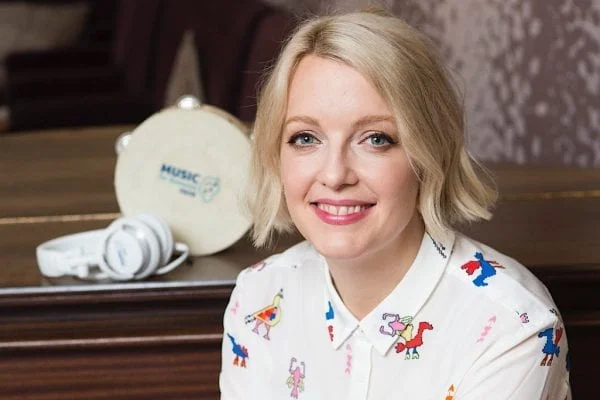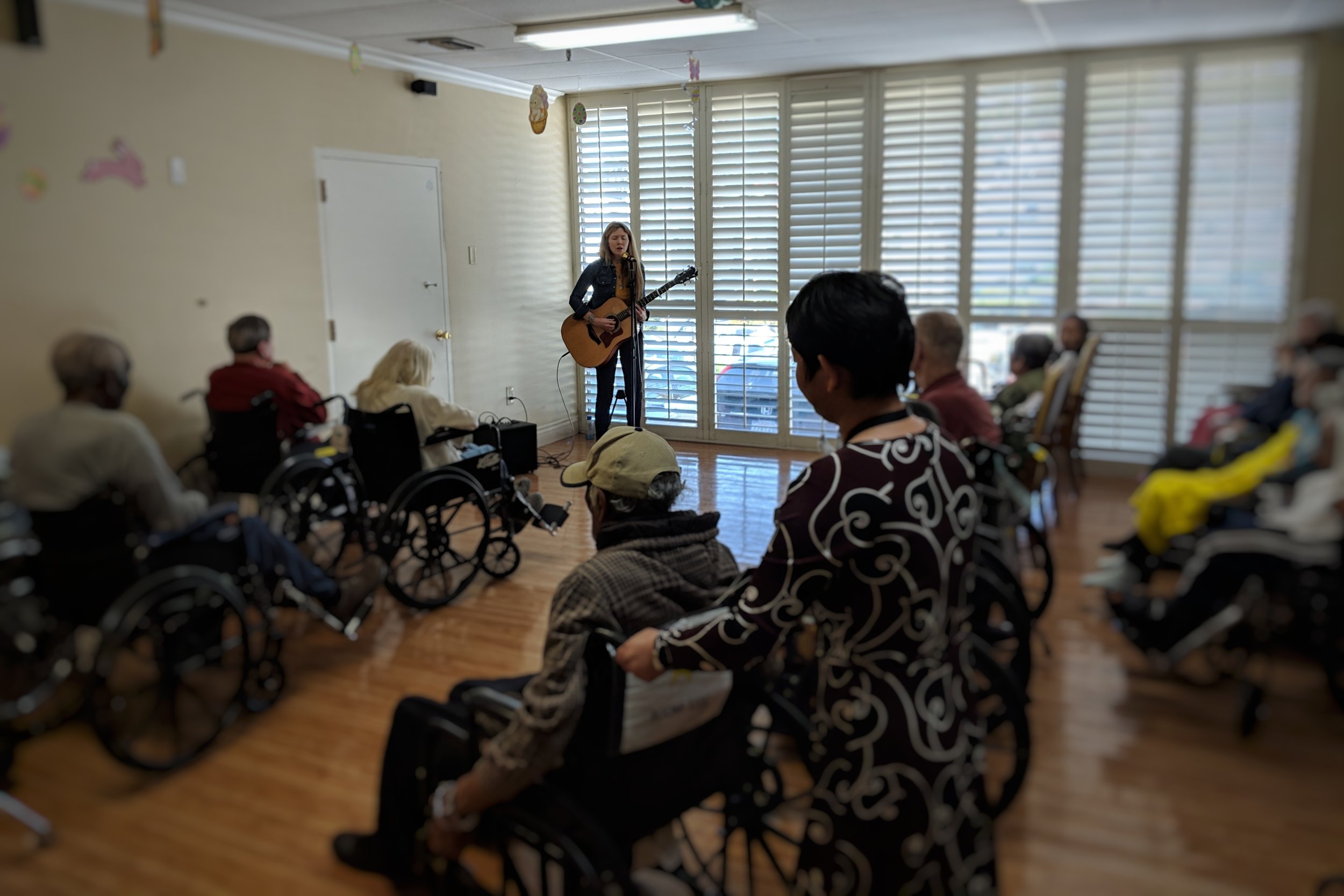Pakistan's News International features Beatie Wolfe's Power of Music
Music may help slow decline of cognitive function in elderly people
By ONLINE
June 11, 2023
ISLAMABAD: You might have come across a video of older persons with dementia where a particular piece of music makes them sway to the music bringing back a flood of memories or despite not remembering their family members they start playing the notes to a song they used to know on the piano or violin.
This phenomenon is what leaves many people puzzled about the neurological disorder that is dementia. How can someone forget their own children’s names but remember something as complex as a classical piece of music. That question was one of the many we aimed to seek an answer to in our April podcast In Conversation Investigating the power of music for dementia.
Joining the conversation this month were Dr. Kelly Jakubowski assistant professor in music psychology at Durham University and Beatie Wolfe singer songwriter and ambassador for the charity Music for Dementia.
Besides its physiological benefits research has also found evidence of music s positive impact on cognitive health.
A recent study suggested that practicing and actively listening to music may help slow the decline of cognitive function in people ages 62-78 years. The researchers found that engaging in musical activities increased the brain s gray matter in some areas, which increased its neuroplasticity the brain s ability to rewire itself which is crucial for learning and forming memories.
In terms of actively practicing music a 2023 study also suggested that long term music training may provide potential functional benefits to the brain and help keep it young.
Such findings make music a potentially powerful tool in treating dementia which is characterized by an array of symptoms that include memory loss and difficulties with thinking language and problem solving.
One other way music may help cognitive health is by becoming a medium for connection. Multiple studies have shown that social isolation and loneliness can speed up the progression of dementia.
I feel like music is the most powerful instant connector almost of any experience and of the arts said Beatie.
The singer songwriter said she believes the arts in general not just music can bemedicinallypowerful extending its power beyond a form of entertainment.
Because [music is] all pervasive it’s not something that requires the person to get up and dance or draw. Someone can just absorb the frequencies and the words and this whole soundscape. For me definitely music was always this kind of powerful resource that I use to feel good. When you have seen the responses I’ve seen to music you have infinite respect and appreciation for it she said.
Being in complete silence
However as much as sound and music have an impact on our health the lack of it silence is just as if not more impactful. A 2020 study found that silence can be relaxing and therapeutic reducing brain wave frequency all the while lowering blood pressure.
In fact, research has also shown the detriment of too much noise and loud sounds on cognitive health. A 2022 study indicated that chronic exposure to loud sounds such as heavy traffic may be a specific risk factor for dementia.
Our guest Beatie shared her thoughts on how complete silence impacted her by recounting her experience in what was the world’s quietest room where she recorded her Raw Space album in the Bell Labs anechoic chamber. It was one of the most profound experiences I think I’ve ever had and it’s something that I continually return to. Even now it feels like it’s almost become more relevant today. As the world’s just got noisier both literally in terms of sonically but also informationally we’re getting bombarded from all angles with social media and notifications and all of these things that are hitting us that are kind of frazzling us she said.
You feel silence it’s almost like you feel this entire sensory reset and your nervous system calms down and you hear sound in this pure way with no echo and no reverb and no enhancements. And you realize [that] we use technology almost now so excessively to iron out all of these things that are actually what make us human beings to begin with
Beatie Wolfe singer songwriter
Beatie seemed to enjoy the experience much more than most people do and ended up spending quite a few hours in that very chamber.
I was told that I’d probably be able to stay in there for 15 minutes because you hear the blood rushing through your veins and the engineers typically had to take breaks because it was so intense. I ended up spending I think it was 100 hours or more she said.
I ended up being in there for the first time for several hours just found it so calming maybe I’m an anomaly. But I had the opposite reaction to [the] freakout that people have which I think is also about really being with yourself. I do think there’s an element of it in the chamber you are there very much with yourself there are no distractions there’s nothing to pull you out of that internal space she continued.
Knowing lyrics over names
On the topic of recalling song lyrics but not remembering one’s own children s names for people with dementia Dr. Guite drew attention to repetition and how music can activate many brain regions and networks simultaneously.
We ve talked about this the globality of music in the brain but the repetition of a child s name is something that’s happened through life whereas the song may be kind of once a month or once a year. How can we explain that she asked.
Dr. Jakubowski said the ability to fill in words of songs was related to procedural memory.
So procedural memories [are] something like remembering motor sequences like being able to ride a bike right So when people might not have this kind of semantic memory anymore for names and places they still have this kind of memory for the motor sequence of singing along lyrics probably because they’ve sang along to that song lots of times before or at least sang along in their minds lots of times before to that piece of music, she said.
She also said that the brain may spare certain parts of this type of memory which could explain why some people are able to recall lyrics or play an old song on an instrument even though they have dementia.
[I]f someone had played the piano previously often they can continue to play those familiar pieces on the piano even quite far into the disease, she said.
In 2014 Beatie established a research project called The Power of Music in a group of care homes in the U.K. run by the Priory Group.
It is easy to see in the video and snapshots of that experience how the people with dementia in those care homes start tapping their feet clapping their hands and singing along some with their eyes shining.
She told us about how it all started with the experience of playing original songs in English in a Portuguese nursing home.
[I]n the case of my father in law I was going to play just to him but I ended up playing to this whole ward of 100 or so people with dementia and Alzheimer s who were all Portuguese. None of them spoke English apart from this relative. And I was playing new songs songs in English that they didn’t have any prior connection with. And I was seeing people singing along as much as they could and clapping and waking up, she said.
Apart from rhyme and alliteration Dr. Jakubowski said the very clear beat is another contributing element.
The tempo of the piece of music is actually very close to what we call the sort of preferred tempo for humans. We have what we call a sort of spontaneous motor tempo which is basically if I asked you to just tap a beat without hearing anything usually people will tap around 120 beats per minute which is around the speed of that piece of music she said.
[I]t’s a very easy piece to clap along with because we feel comfortable clapping at that speed. So I think that invites participation as well, she added.
TEDMED talk "How music can rescue and restore our humanity” from Beatie Wolfe
Guitar Center Magazine: The Sound of Beatie Wolfe | Making the Familiar Futuristic
She Rocks 2020 - Beatie Wolfe's award speech and performances
TEDMED2020 x Beatie Wolfe - the script
TEDMED invite Beatie Wolfe to talk
The Cheshire Magazine highlight dementia work
DLD News profiles Beatie Wolfe
Lauren Laverne joins as latest Ambassador
Barbican newsletter highlights Beatie Wolfe
Playing to people living with dementia in Silver Lake
Playing forward in Los Angeles with the support of The Utley Foundation.
Learn more about Beatie Wolfe’s work exploring the benefits of Music on those living with dementia here (+)
Thank you for the generous support of The Utley Foundation for making this possible.
*Please note person faces have been obscured to protect their privacy.















